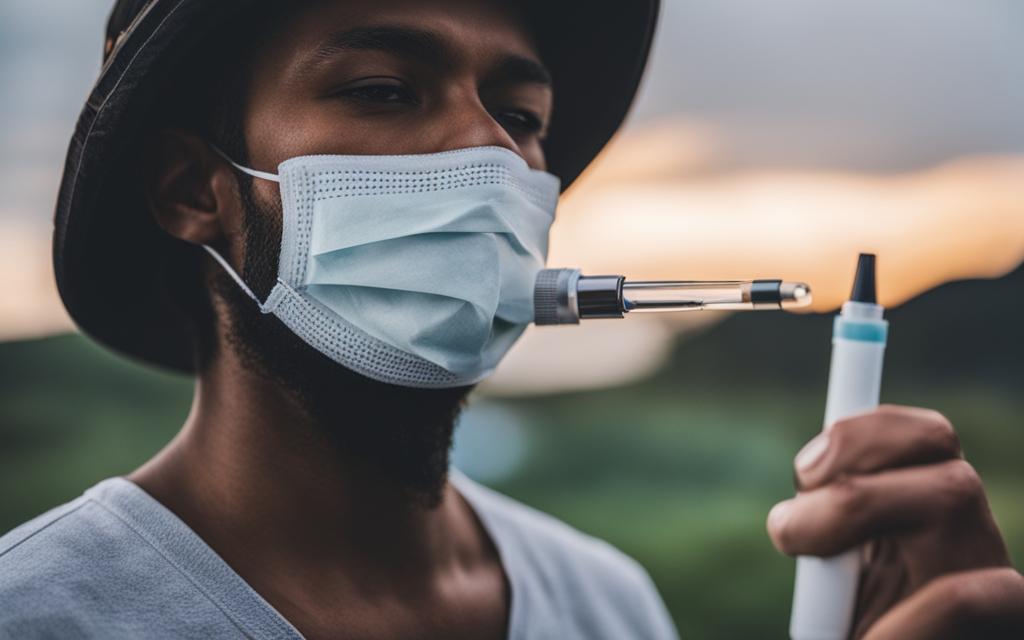Vaping is the act of inhaling the aerosol from an e-cigarette or vape device. While vaping was initially marketed as a safer alternative to traditional cigarettes, it has been linked to serious health issues such as lung injuries, seizures, strokes, cardiovascular problems, and even death. After oral surgery, particularly tooth extraction, it is important to avoid smoking or vaping due to the potential risks it poses to the healing process. Smoking or vaping can cause inflammation, delay healing, increase the risk of infection, and can even lead to complications like dry socket. It is best to abstain from smoking or vaping for at least 48 hours or longer after tooth extraction to promote a safe and smooth recovery.
Table of Contents
ToggleKey Takeaways:
- Vaping after tooth extraction can hinder the healing process and increase the risk of complications.
- Smoking or vaping can cause inflammation, delay healing, and increase the risk of infection.
- Avoid smoking or vaping for at least 48 hours after tooth extraction for a safe and smooth recovery.
- Consult with your dentist or oral surgeon for specific instructions and recommendations.
- Be aware of the potential dangers and risks associated with vaping, especially after oral surgery.
The Dangers of Vaping
Vaping is not a safe alternative to smoking. It poses significant risks to your health and has been associated with various serious injuries and illnesses. Here are some of the dangers you need to be aware of:
Lung Injuries
One of the most concerning risks of vaping is the potential for lung injuries. Vaping-related lung injuries, also known as EVALI (E-cigarette or Vaping Product Use-Associated Lung Injury), have been reported across the United States. These injuries can cause severe respiratory symptoms, such as coughing, shortness of breath, chest pain, and even respiratory failure.
Seizures and Strokes
Studies have shown that vaping can increase the risk of seizures and strokes. The nicotine present in e-cigarettes can have a direct impact on the cardiovascular system, leading to an increased risk of blood clots, heart attacks, and strokes. This is especially concerning for individuals with pre-existing cardiovascular conditions.
Cardiovascular Issues
Vaping can also have detrimental effects on your heart health. The chemicals found in e-cigarettes can cause inflammation and damage to the blood vessels, increasing the risk of hypertension, atherosclerosis, and other cardiovascular diseases.
Nicotine Addiction
Many e-cigarettes contain high levels of nicotine, which can lead to nicotine addiction. Nicotine addiction can have long-term consequences for your health and well-being. It can lead to cravings, withdrawal symptoms, and an increased risk of using other tobacco products.
Battery Explosions
Another significant danger of vaping is the risk of battery explosions. Poorly manufactured e-cigarette devices can malfunction, leading to battery explosions and severe injuries. These explosions can cause burns, fractures, and other traumatic injuries.
Lack of Regulation
The vape industry is poorly regulated, allowing for the sale of products that may contain harmful substances or misleading labeling. The long-term effects of vaping are still being studied, and there is a lot that is unknown about the potential risks and consequences.
It is crucial to be informed about the dangers of vaping and make decisions that prioritize your health and well-being. In the next section, we will explore the specific risks of smoking and vaping after oral surgery.

Smoking and Vaping After Oral Surgery
Smoking or vaping after oral surgery can pose serious risks and complications. The heat, tar, and chemicals from smoking or vaping can irritate the healing tissues, increasing the chances of infection. Additionally, the suction motion involved in smoking or vaping can traumatize the incision site and dislodge the blood clot, leading to a condition called dry socket. Dry socket is not only painful but also delays the healing process as it exposes the underlying nerves.
To promote a safe and smooth recovery, it is highly recommended to refrain from smoking or vaping for at least 48 hours after tooth extraction. By giving your body time to heal without exposure to the harmful substances in cigarettes or vape devices, you can minimize the risks and support proper healing. It is always best to consult with your dentist or oral surgeon for specific instructions and recommendations tailored to your unique situation.
Remember, your oral health and overall well-being are of utmost importance. Making the decision to avoid smoking or vaping after oral surgery is a crucial step towards a successful recovery. By prioritizing your health and following the guidance of your dental professionals, you can ensure a smoother healing process and reduce the likelihood of complications.
FAQ
Can I vape after having a tooth pulled?
It is recommended to avoid vaping after tooth extraction to promote proper healing. The aerosol and chemicals from vaping can irritate the healing tissues and increase the risk of complications.
Is it safe to vape after dental surgery?
No, it is best to refrain from vaping after any dental surgery, including tooth extraction. Vaping can delay healing, increase the risk of infection, and potentially lead to complications such as dry socket.
What are the risks of smoking after oral surgery?
Smoking after oral surgery, including tooth extraction, can have severe complications. It can delay healing, increase the risk of infection, cause inflammation, and lead to dry socket, a painful condition that hinders the healing process.
Can I smoke after tooth removal?
It is advisable to avoid smoking after tooth removal. The heat, tar, and chemicals from smoking can irritate the healing tissues, delay the healing process, and increase the risk of complications.

